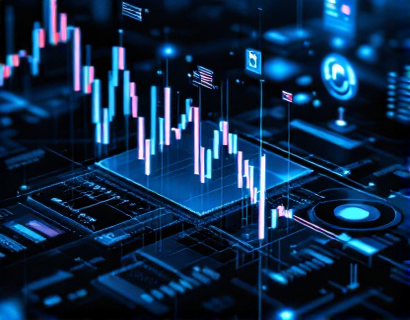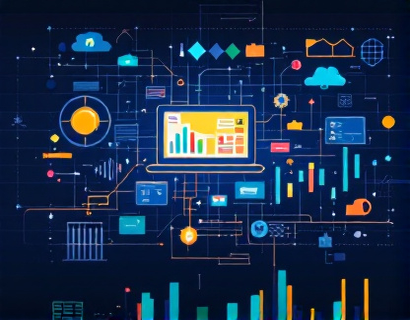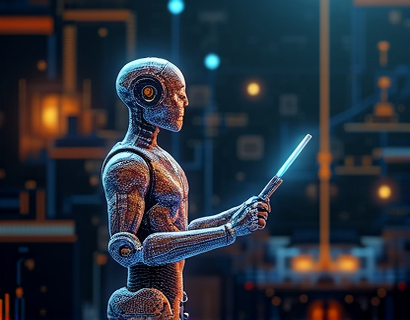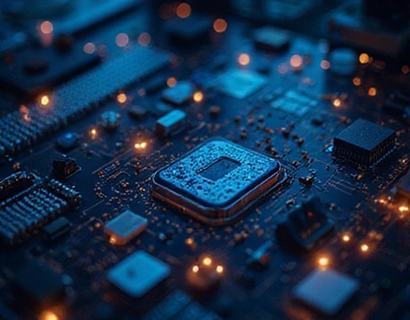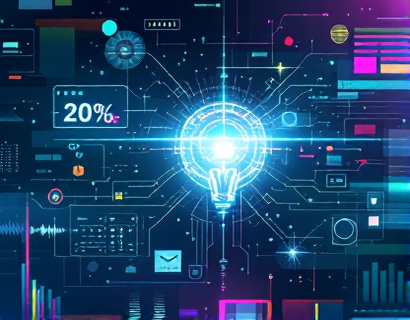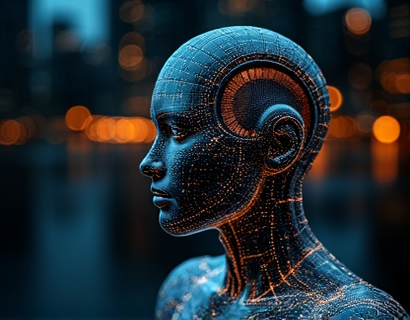AI and Crypto: Pioneering Financial Innovation
The intersection of artificial intelligence (AI) and cryptocurrency is a fertile ground for innovation, reshaping the landscape of digital finance and technology. This fusion is not just a trend but a transformative force that is redefining how we interact with financial systems, enhancing user experiences, and setting new benchmarks in both the tech and finance sectors. As we delve into this topic, it's essential to understand the fundamental roles that AI and cryptocurrency play individually and how their convergence is driving unprecedented changes.
Understanding AI in Finance
Artificial intelligence, characterized by its ability to learn, reason, and automate tasks, has been increasingly adopted in the financial sector. In traditional finance, AI is used for risk management, fraud detection, algorithmic trading, and customer service through chatbots. These applications leverage machine learning algorithms to analyze vast amounts of data, identify patterns, and make predictions or decisions with minimal human intervention. The precision and speed of AI in these tasks have significantly improved efficiency and accuracy, reducing operational costs and enhancing service quality.
Cryptocurrency: A New Paradigm in Digital Finance
Cryptocurrency, on the other hand, represents a decentralized and digital form of currency that operates on blockchain technology. It eliminates the need for intermediaries such as banks, offering a peer-to-peer transaction system that is transparent, secure, and censorship-resistant. The most well-known cryptocurrency, Bitcoin, was launched in 2009, but the ecosystem has since expanded to include thousands of altcoins, each with unique features and use cases. Cryptocurrencies have disrupted traditional financial systems by providing alternative methods for storing value, conducting transactions, and investing.
Synergy Between AI and Cryptocurrency
The combination of AI and cryptocurrency creates a powerful synergy that is driving financial innovation. AI can enhance various aspects of the crypto ecosystem, from market analysis and trading strategies to security and user experience. Here are some key areas where this fusion is making a significant impact:
Market Analysis and Predictive Analytics
One of the most compelling applications of AI in the crypto space is market analysis. Traditional financial markets rely heavily on fundamental and technical analysis, but the sheer volume of data in cryptocurrency markets makes manual analysis impractical. AI algorithms can process and analyze vast datasets, including historical price data, news articles, social media sentiment, and macroeconomic indicators, to identify trends and predict future price movements. This predictive analytics capability allows traders to make more informed decisions, potentially increasing their returns and reducing risks.
Moreover, AI-driven predictive models can adapt in real-time to market changes, offering dynamic insights that are crucial in the fast-paced world of crypto trading. These models can also detect anomalies and potential fraud, enhancing market integrity and investor protection.
Enhanced Trading Strategies
AI algorithms can optimize trading strategies by automating the execution of trades based on predefined criteria. Algorithmic trading, powered by AI, can execute thousands of transactions per second, capitalizing on market opportunities that human traders might miss. This automation not only increases trading efficiency but also reduces emotional biases that can lead to suboptimal decisions.
Additionally, AI can help in portfolio management by dynamically adjusting asset allocations based on market conditions and risk tolerance. This adaptive approach ensures that investment portfolios remain optimized, maximizing returns while managing risk effectively.
Improved Security Measures
Security is a paramount concern in the crypto world, given the decentralized and digital nature of cryptocurrencies. AI plays a crucial role in enhancing security through advanced threat detection and prevention systems. Machine learning models can analyze transaction patterns and user behavior to identify suspicious activities, such as fraudulent transactions or phishing attempts. These systems can alert users and automate the blocking of malicious activities, providing an additional layer of protection.
Furthermore, AI can strengthen the security of blockchain itself by improving consensus mechanisms and enhancing the robustness of smart contracts. By detecting and mitigating vulnerabilities, AI helps maintain the integrity and reliability of the blockchain network.
Enhanced User Experience
The user experience in the crypto space can be significantly improved through AI-driven innovations. Chatbots and virtual assistants powered by natural language processing (NLP) can provide 24/7 customer support, answering queries and guiding users through complex processes. These AI assistants can handle a wide range of tasks, from explaining crypto concepts to assisting with wallet management and transaction execution.
Moreover, AI can personalize the user experience by recommending services and products based on individual preferences and behavior. This personalized approach not only enhances user satisfaction but also fosters greater engagement with crypto platforms and services.
Case Studies and Real-World Applications
To better understand the practical implications of AI in the crypto space, let's explore some real-world applications and case studies:
1. Crypto Trading Bots
Crypto trading bots are a prime example of AI in action within the crypto ecosystem. These bots use AI algorithms to monitor multiple exchanges, execute trades, and manage portfolios autonomously. One notable example is the MetaTrader 5 (MT5) platform, which supports custom indicators and bots developed by third-party developers. These bots can be programmed to follow specific trading strategies, such as mean-reversion or momentum trading, and can operate around the clock, maximizing market opportunities.
2. Decentralized Finance (DeFi) Platforms
DeFi platforms are leveraging AI to create more efficient and accessible financial services. For instance, AI-powered lending protocols can assess creditworthiness and determine loan terms in real-time, reducing the need for manual underwriting. This not only speeds up the lending process but also makes financial services more inclusive by lowering barriers to entry.
Another example is AI-driven yield optimization in DeFi, where algorithms analyze various protocols and asset combinations to maximize returns while managing risk. These smart strategies ensure that users can achieve higher yields without extensive manual intervention.
4. Non-Custodial Wallets with AI Enhancements
Non-custodial wallets, where users maintain control over their private keys, can be enhanced with AI to improve usability and security. AI-driven wallet interfaces can offer predictive typing, error correction, and secure authentication methods, making it easier and safer for users to manage their cryptocurrencies. Additionally, AI can monitor wallet activity and alert users to potential security threats, providing an extra layer of protection.
Challenges and Considerations
While the integration of AI and cryptocurrency offers numerous benefits, it also presents several challenges that need to be addressed:
Data Privacy and Regulation
The use of AI in the crypto space raises significant concerns regarding data privacy and regulatory compliance. Cryptocurrencies are often associated with anonymity, but AI-driven analysis can potentially trace transactions and identify users, posing privacy risks. Moreover, the regulatory landscape for crypto is still evolving, and AI applications must comply with varying laws and regulations across different jurisdictions. Ensuring compliance while maintaining the decentralized nature of crypto is a complex but essential task.
Technical Complexity and Integration
Integrating AI into the crypto ecosystem requires sophisticated technical solutions and expertise. Developing AI models that can handle the unique characteristics of crypto markets, such as high volatility and 24/7 operation, is a non-trivial challenge. Additionally, integrating these AI systems with existing crypto infrastructure, including exchanges, wallets, and DeFi protocols, requires seamless interoperability and robust security measures.
Ethical Considerations
The use of AI in finance, including the crypto space, raises ethical questions about algorithmic bias, transparency, and accountability. AI models trained on historical data may inadvertently perpetuate biases present in that data, leading to unfair outcomes. Ensuring that AI systems are transparent, fair, and accountable is crucial to building trust and fostering widespread adoption.
Future Prospects
Looking ahead, the convergence of AI and cryptocurrency is poised to drive further innovation and transformation in the financial sector. Some potential future developments include:
1. Advanced Predictive Models
As AI algorithms become more sophisticated, predictive models will become even more accurate, incorporating a wider range of data sources and more complex machine learning techniques. This will enable more precise market predictions and better-informed investment decisions.
2. Enhanced Smart Contracts
AI can enhance the functionality of smart contracts by making them more adaptive and intelligent. Future smart contracts could incorporate AI-driven logic to handle more complex scenarios, automate more processes, and interact more seamlessly with other blockchain components.
3. User-Centric Financial Services
The focus on user experience will continue to drive AI innovations in the crypto space. Personalized financial services, intuitive user interfaces, and seamless integration of crypto assets into everyday financial activities will become more prevalent, making crypto more accessible and user-friendly.
4. Cross-Chain Interoperability
AI can play a pivotal role in achieving cross-chain interoperability, enabling seamless interactions between different blockchain networks. This will facilitate the creation of a more interconnected and efficient crypto ecosystem, where assets and data can flow freely across platforms.
In conclusion, the fusion of AI and cryptocurrency is a powerful force that is reshaping the financial landscape. By leveraging the strengths of both technologies, we can expect to see more innovative, secure, and user-friendly financial solutions that drive growth and inclusivity in the digital economy.




